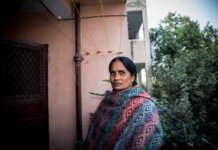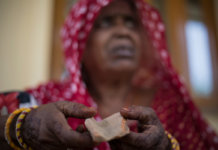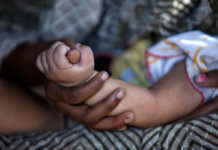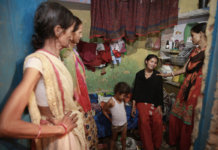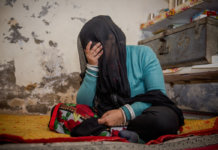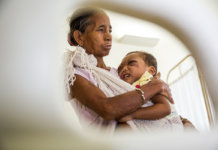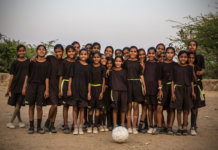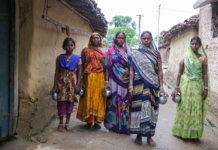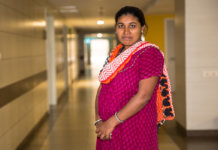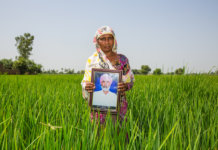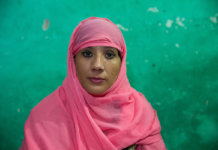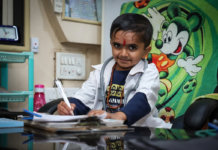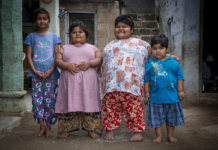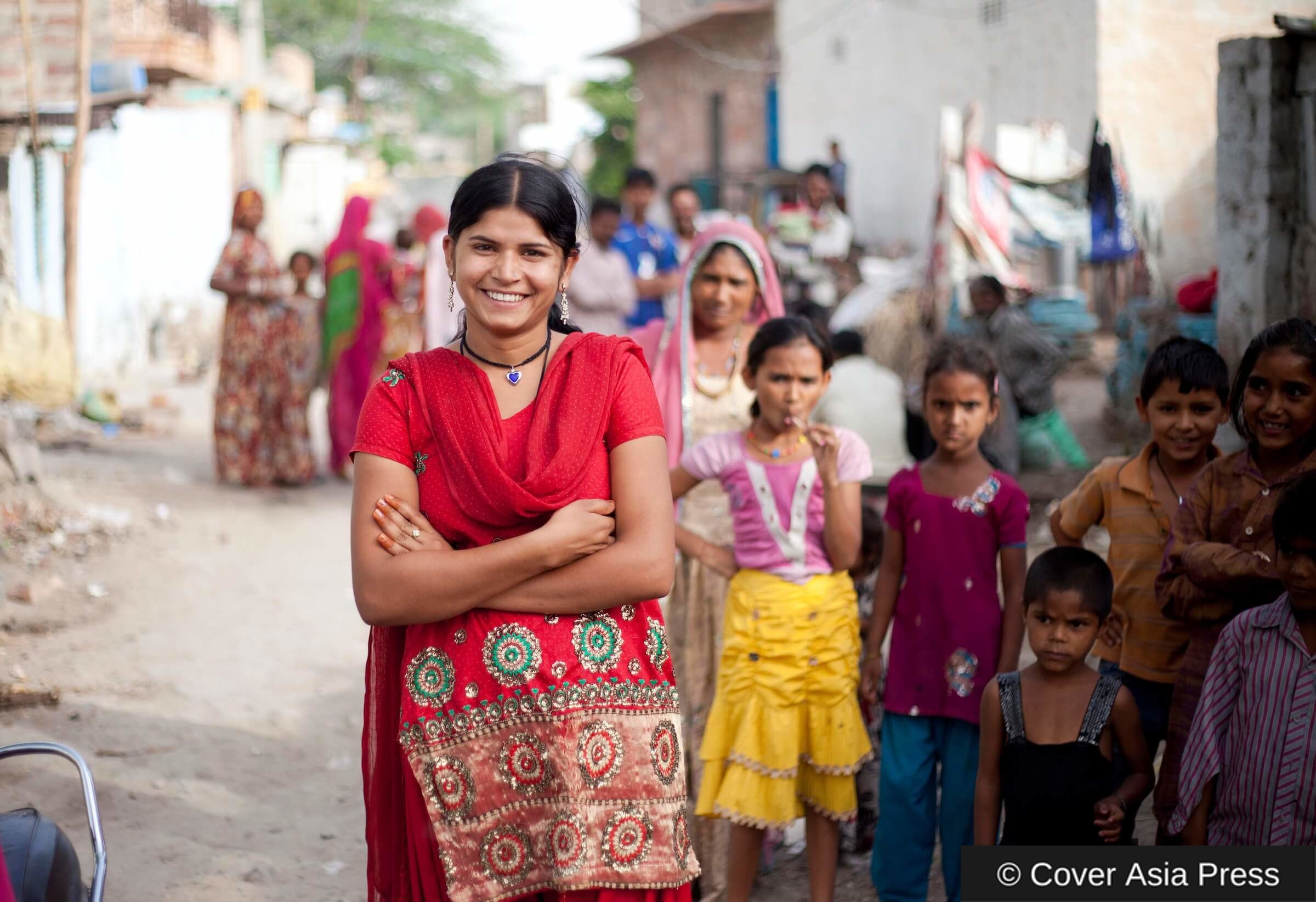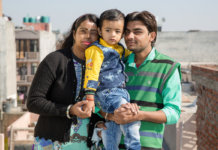Laxmi Sargara is beaming with joy. “Today is the second happiest day of my life,’’ she says, smiling broadly while holding the hand of her newly-wedded husband Mahendra.
It’s her wedding day and the last time she was so elated was a year ago when at the age of 18 she managed to get her first marriage – conducted when she was barely a year old – annulled.
“I don’t even want to think about the past,’’ she says. “It was truly harrowing. I am so very happy right now. I’ve overcome my past and I hope I have a bright future ahead of me. I’d like to forget it all and start again. This is a new chapter of my life.’’
Laxmi, who hails from a village in the desert state of Rajasthan in western India, hit international headlines in 2012 after she became one of the first women in India to annul her child marriage.
I’ve overcome my past and I hope I have a bright future ahead of me
She was told – on her 18th birthday – that she had been married aged one as a child bride to a boy named Rakesh who was aged three at the time. Now that she had become an adult, she was expected to join her husband and in-laws.
Devastated, Laxmi ran away to her brother who lived in Jodhpur, and sought his help to stop her in-laws from taking her away to their home.

Although child marriages have been outlawed in India since 1929 they are still common in many parts of the country, especially rural areas. Families rely on these arrangements to provide financial stability and consider arranged marriage as a means of ensuring their children will be cared for in the long term.
Her marriage was part of a tradition called Mousar in Laxmi’s community – when an elderly relative dies a younger relative gets married within 13 days. The community believes that after a death, a marriage brings happiness and keeps away bad spirits. Usually this tradition is followed when a close relative like a mother, father or grandparent dies. There is no grand function, and both the child bride and groom are just made to sit with each other followed by prayers. No money is involved nor are any documents signed.
When Laxmi was a year old, her grandmother died and her grandfather and uncle, following tradition, decided Laxmi should marry. They found three-year-old Rakesh from a neighbouring village, a 10-minute drive away, as the perfect match.

The marriage took place in a village, close to Laxmi’s home, but her parents were unaware of the ceremony. As in many communities in India, the uncle and grandfather are as much involved in the lives of the children as the parents are, so when they took her away for the marriage ceremony, her parents didn’t suspect anything.
When Laxmi was a year old, her grandmother died and her grandfather and uncle, following tradition, decided Laxmi should marry
Laxmi’s father, Teja Ram Sargara and mother Sukdi only found out about the marriage a few weeks later but could not object as it was tradition and culturally respectful to adhere to the wishes of the rest of the family.
“My parents had little to say in the matter,’’ says Laxmi. “Marriage in our community is about families, not individual needs. It’s our tradition.’’
However when she turned 18 and was expected to go to her in-laws’ house, Laxmi pointedly refused. She was terrified of living a life she wanted no part of, even though she understood it wasn’t her parents’ fault.
“My parents have always loved me; I have no doubt about that. I know they wouldn’t have had much choice in the situation. As a female, my mother wouldn’t have any authority in any decision making, even about me and my life. It’s only the men who decide for the entire family.’’
Unwilling to live with a man she had never agreed to marry, she decided to run away and seek the help of her brother, Hanuman. “I knew my brother would help me.”

Hanuman promised to help her. “I just want my sister to be happy,’’ he said and contacted a charity that supports local men and women in need – Sarathi Trust.
Thanks to Kriti Bharti, the person running the charity, and the government’s Women and Child Development Department, Laxmi managed to get her marriage annulled.
The annulment made news in India as well as internationally.
“I have gone through a tough time,” Laxmi says. “Annulling the marriage wasn’t accepted by my society initially so I went through a lot of pain to get here today and I needed to stay strong. Thanks to Kriti we got through the tough time together.’’
It didn’t take long for Laxmi to become a symbol of hope for child brides all over the world.
Initially it was feared Laxmi would never marry again because of the stigma attached to her controversial annulment.
Then, at a neighbour’s wedding late last year, Laxmi’s parents met Mahendra, 23, a farmer.
“I knew it was going to be difficult for me to remarry but my family stood by me and helped me choose a mature husband,” says Laxmi. “When I met Mahendra I told him everything and thankfully he had stability and the intelligence to see past all the controversy.’’
Laxmi was overjoyed to have 150 of her family and friends at the wedding celebrations on January 31, 2013. She had fought out-dated beliefs and customs to achieve her happiness, and her wedding was a sign of hope for many young girls trapped in child marriages all over India and beyond.
However, Laxmi feared her former in-laws would turn up at the wedding demanding money from her new in-laws but thankfully they stayed away and it was the magical day she had always hoped for.
“My new husband has been mature enough to understand my position and he accepts my past. My life was almost ruined but now I can see a happy future,’’ she says.
Mahendra was also worried about his family’s attitude towards Laxmi at first but he managed to help them take a more positive view.
“Child marriage is not a good practice,” he says. “Laxmi has taken a very strong and bold step against such a negative practice, which is very important, and that’s what I told my family. I’m very proud of her.
“I was looking for a beautiful yet honest wife and I have found that in Laxmi. At first my family didn’t agree with my choice but they soon understood my thinking.

“My family is very traditional also, but not in traditions that are bad for someone’s life. They want only the good for people.’’
Mahendra and Laxmi are now enjoying life as newly-weds and are planning their future.
“Right now I just want to give happiness to Laxmi but if she wants to work or study I will support her. Of course, females look after the household stuff in our community, but after that she can go and do whatever she wishes,’’ he says.
Laxmi is settling into her new home with her new in-laws in Jodhpur but she still wants to fulfil her dream of working. “Child marriage affects children both mentally and physically,” she says. “It’s torture in every way possible. I hope all parents realise that marrying their children at such a young age threatens their future. They need to stop, now.’’
Child activist Kriti, 25, says: “Laxmi has been on a huge journey and she’s managed to learn a whole new way of living her life. I helped with her rehabilitation and to build her confidence again.
“She’s now living her life to her own agenda and I’m very happy for her. She looked very beautiful at her wedding, and more importantly happy. It was a special day.’’

